Lifestyle changes such as increased sleep, caffeine reduction, meditation, and eating a balanced diet can significantly reduce anxiety.
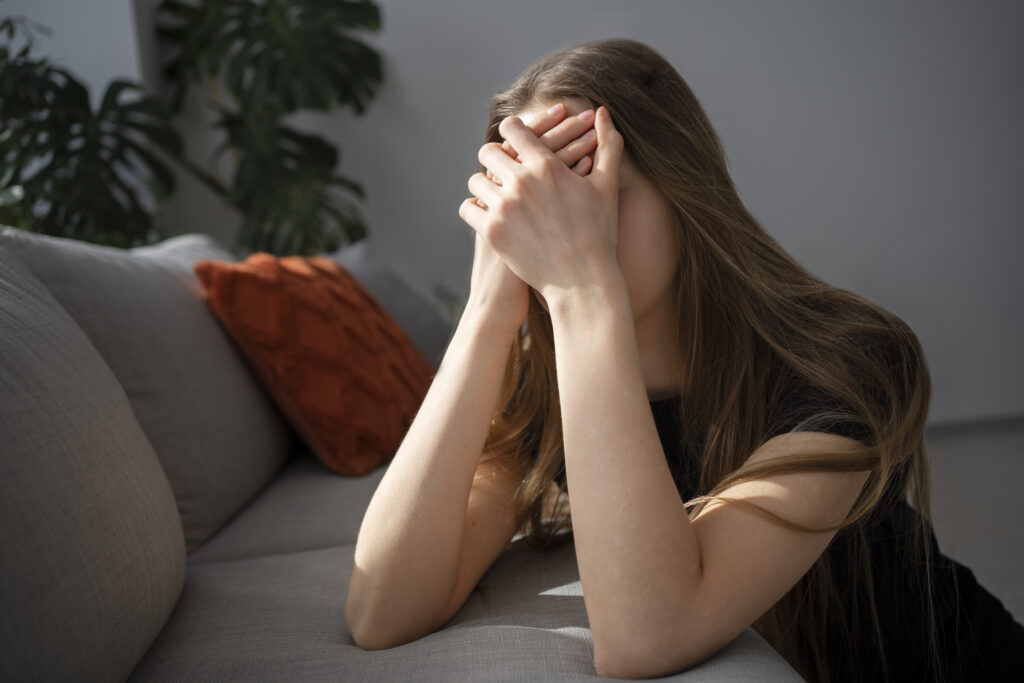
In today’s world, where stress seems to be an inevitable part of our daily lives, finding natural ways to relieve anxiety has become more important than ever.
If you’re looking for effective and holistic strategies to promote mental wellness, you’ve come to the right place. In this comprehensive guide, we will explore “10 Ways to Reduce Anxiety Naturally.” This article offers actionable insights to help you manage anxiety in a sustainable way. is designed to provide Let’s begin the journey together to a calmer, more balanced life. Before we get into how to reduce anxiety, let us define anxiety.
- What is Anxiety?
- 10 Ways to Naturally Reduce Anxiety
- 1.Mindful Breathing Techniques
- 2.Regular Exercise Routine
- 3.Balanced Diet and Hydration
- 4.Adequate Sleep
- 5.Use Herbal Remedies
- 6.Limit Caffeine and Sugar Intake
- 7.Journaling and Expressive Writing|
- 8.Mindfulness Meditation
- 9.Social Connections
- 10. Engage in Positive Self-Talk
What is Anxiety?
Anxiety is a natural and adaptive response to stress, characterized by feelings of fear, dread, or uneasiness. Although it serves as a normal part of the human experience, excessive or persistent anxiety can interfere with daily life and well-being. It manifests physically and emotionally, affecting thoughts, behaviors and overall functioning.
Symptoms of anxiety:
- Too much trouble
- restlessness
- Fatigue
- Difficulty concentrating
- Irritability
- Muscle tension
- Sleep disturbance
- Increased heart rate
- Sweating.
- Gastrointestinal problems
Please note that anxiety can present differently for different people. Every person have different experience While anxiety is a normal part of life, persistent or excessive anxiety can lead to various challenges in daily functioning. Understanding the different forms of anxiety is essential for effective management.
Different forms of anxiety
| Aspect | Everyday Anxiety | Anxiety Disorders |
|---|---|---|
| Nature | Normal response to common stressors. | Persistent and excessive anxiety. |
| Duration | Temporary and time-limited. | Lasts for an extended period (6 months or more). |
| Intensity | Proportional to the situation. | Disproportionate reactions to situations |
| Resolution | Resolves when the stressor is addressed. | Requires professional intervention. |
| Impact on Functioning | Typically does not significantly impact daily functioning. | Can significantly impair daily life and well-being. |
10 Ways to Naturally Reduce Anxiety
1.Mindful Breathing Techniques:
In the pursuit of natural anxiety relief, mastering mindful breathing techniques can be a game-changer. Mindful breathing not only helps calm the mind but also promotes a sense of presence and relaxation. In this detailed guide, we’ll explore effective breathing techniques to relieve anxiety and increase your overall well-being.
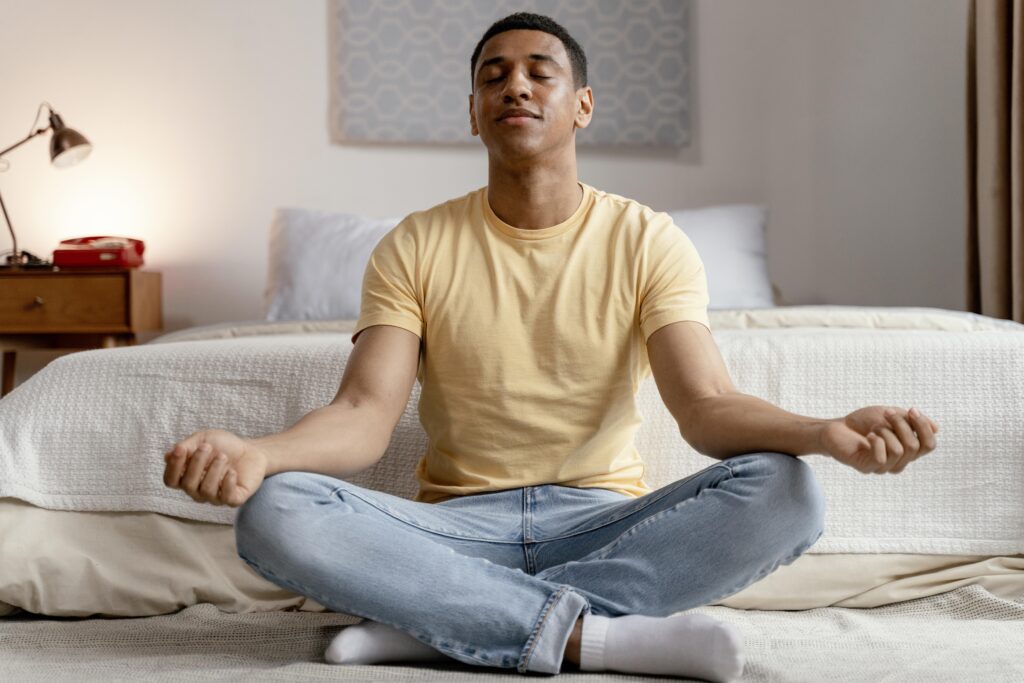
- Diaphragmatic breathing:
Start by finding a comfortable place to sit or lie down. Place one hand on your stomach and the other on your chest. Breathe deeply through your nose, letting your diaphragm expand. Feel your belly rise, and then exhale slowly through your mouth. Focus on the rise and fall of the rhythm of your breath, distracting yourself from anxious thoughts. - 4-7-8 Breathing:
Alternatively known as “relaxation breathing,” this method involves four counts of inhalation, seven counts of breath holding, and eight counts of exhalation. This pattern helps to regulate your breathing and activates the body’s relaxation response, making it an effective stress reliever. - Box Breathing (Square Breathing):
Imagine a square in your mind. Inhale for a count of four, hold for a count of four, exhale for a count of four, and then hold for another four counts before starting the cycle again. This structured approach promotes balance and focus, helping to reduce anxiety. - Body Scan Breathing:
Combine mindful breathing with a body scan. Inhale, direct your breath to a specific part of your body (e.g., your chest or abdomen), and exhale, releasing any tension in that area. Slowly scan and relax different parts of your body, promoting an overall sense of relaxation.
These mindful breathing techniques into your daily routine to experience profound anxiety-relieving benefits. Whether you are a beginner or a seasoned practitioner, these techniques offer a gateway to relaxation, promote a calmer mind, and make you more focused and flexible. Embrace the power of mindful breathing as you navigate your way to natural anxiety reduction.
2.Regular Exercise Routine:
A regular exercise routine is not just about physical fitness. This is a powerful strategy for naturally reducing anxiety and increasing overall well-being. we’ll explore the benefits of changing to a consistent exercise regimen and provide actionable insights for making fitness an integral part of your anxiety management plan.
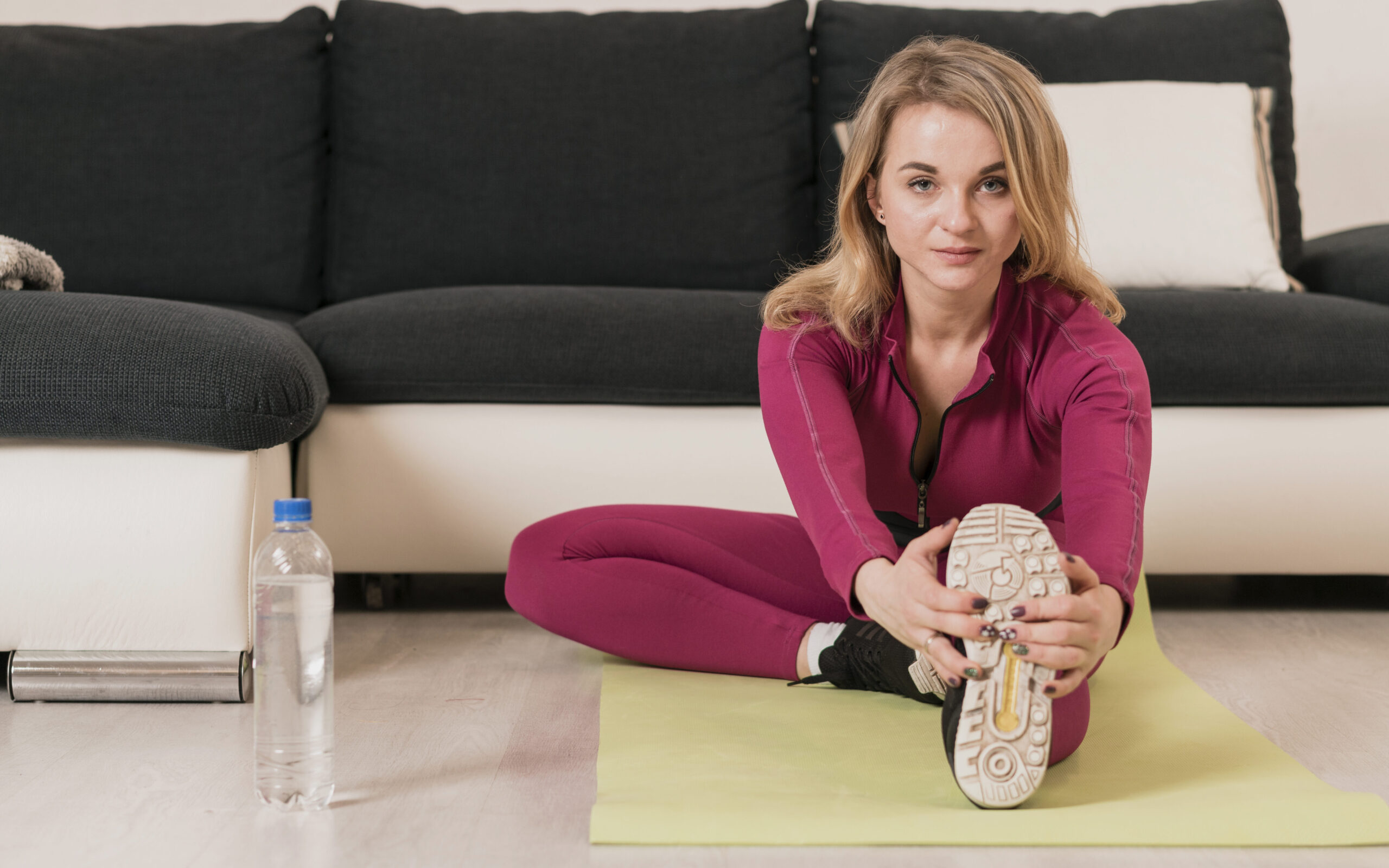
- Cardiovascular Exercise to Eliminate Stress:
Do aerobic activities such as cycling, jogging, or brisk walking. These activities raise your heart rate, releasing the body’s natural mood-boosting endorphins, which in turn reduce anxiety and increase feelings of positivity. - Yoga for mind and body harmony:
Discover the overall benefits of yoga. Its combination of postures, breath control and meditation promotes relaxation and mindfulness. Certain yoga poses, such as Child’s Pose and Savasana, can be especially soothing for anxiety relief. - High Intensity Interval Training (HIIT) for Quick Wins:
Short on time? HIIT workouts offer an effective way to increase both physical fitness and mental well-being. A quick burst of intense activity followed by a short rest period can significantly reduce anxiety levels. - Outdoor activities to breathe fresh air:
Take your exercise outside. Whether it’s hiking, running, or participating in sports, exposure to nature and fresh air enhances the mood-enhancing benefits of exercise, leading to feelings of relaxation. - Customize Your Routine:
Tailor your exercise routine to your preferences. Whether it’s dancing, swimming, or playing a sport, choosing activities you enjoy provides motivation, making you more likely to stick to your routine.
Embrace the transformative power of a regular exercise routine as the cornerstone of your anxiety management strategy. By incorporating varied and enjoyable activities into your schedule, you’re not only investing in your physical health, but also unlocking the key to a more balanced and resilient mind. Start your journey to relief from anxiety with the effective method of regular exercise.
3.Balanced Diet and Hydration:
In achieving natural anxiety reduction, the importance of a balanced diet and adequate hydration cannot be overstated. we describes the impact of changing nutrition and hydration on mental well-being, offering actionable insights to help you make informed choices for a calmer, more balanced life.

- Nutrient-rich foods for mood stability:
Prefer nutritious foods rich in vitamins, minerals and antioxidants. Add colorful fruits, vegetables, whole grains and lean proteins to your diet to help support overall brain health and mood stability. - Omega-3 Fatty Acids for Brain Health:
Include sources of omega-3 fatty acids, such as fatty fish, flaxseeds and walnuts. These essential fats play an important role in brain function and have been linked to reduced anxiety symptoms. - Hydration for Cognitive Function:
Stay properly hydrated throughout the day. Dehydration can affect cognitive function and increase feelings of stress. Aim to drink at least eight glasses of water per day and adjust based on factors such as physical activity and climate. - Eating habits:
Develop smart eating habits. Pay attention to your body’s hunger and fullness signals, savor every bite, and create a positive eating environment. Mindful eating can contribute to a healthy relationship with food and reduce stress-related eating patterns. - Limit processed foods and sugar:
Minimize consumption of processed foods and refined sugars. These can cause mood swings and energy crashes.
Nourish your body and mind with a balanced diet and proper hydration, unlocking the potential of natural anxiety relief. By making intentional and informed choices about what you eat, you’re not only promoting physical health, but also building a foundation for mental wellness. Begin your journey to a calmer, more balanced life through the transformative power of nutrition and hydration.
4.Adequate Sleep:
In the realm of natural anxiety reduction, the often overlooked hero is a good night’s sleep. We offering practical insights to help you unlock the calming benefits of quality rest for a more calm and balanced life.
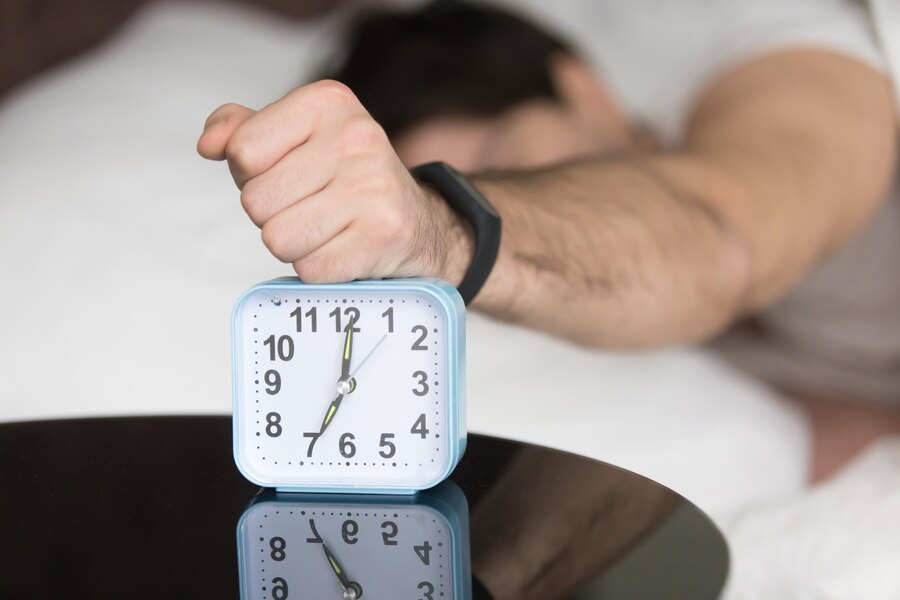
- Prefer a consistent sleep schedule:
Set a regular sleep schedule by aiming to go to bed and wake up at the same time each day. It reinforces your body’s natural circadian rhythm, promoting a sense of routine that signals your brain when it’s time to wind down or wake up. - Create a relaxing bedtime routine:
Create a quiet bedtime routine to signal your body that it’s time to transition from wakefulness to rest. Engage in activities like reading, gentle stretching, or listening to soothing music to help relax your mind and body. - Limit screen time before bed:
Minimize exposure to screens at least an hour before bed. The blue light emitted by devices can disrupt the production of melatonin, a hormone important for sleep regulation, potentially affecting your ability to fall asleep easily. - Physical activity for sleep quality:
Engage in regular physical activity, but try to complete vigorous exercise early in the day. Exercise promotes better sleep, but vigorous activity close to bedtime can have the opposite effect. - Manage stress before bed:
Add stress-reducing activities to your evening routine. Whether it’s journaling, practicing relaxation techniques, or taking a warm bath, finding ways to relax can contribute to a more peaceful transition into sleep.
Reclaim the night as a haven for peace and rejuvenation. Adequate sleep is not just a luxury but an important component of stress relief and mental resilience. By implementing these practical tips, you’re not only improving your sleep, but setting the stage for a more balanced and peaceful existence. Sweet dreams await on a quiet, well-rested trip.
5.Use Herbal Remedies:
When it comes to naturally relieving anxiety, the world of herbal remedies unfolds as a rich tapestry of calming possibilities. we’ll explore the relaxing realm of botanical solutions, offering insight into herbal remedies that can help you find peace and balance amid life’s stresses.
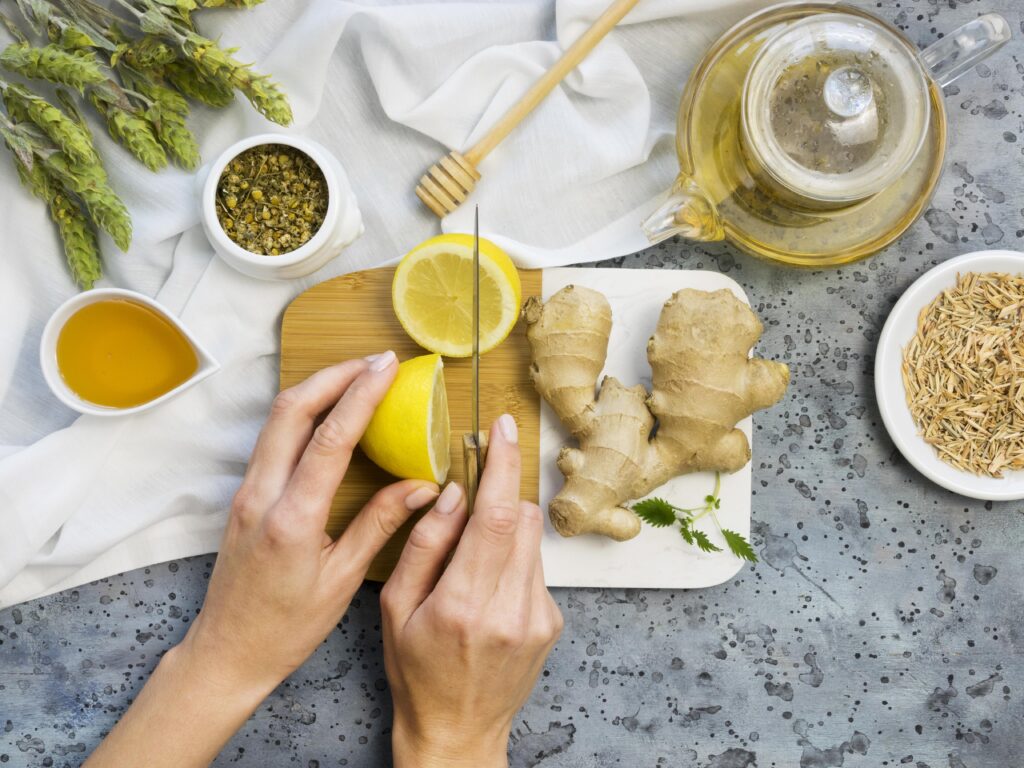
- Chamomile Tea:
Embrace the gentle power of chamomile tea. This herbal infusion, derived from the chamomile flower, is celebrated for its calming properties. Sip a warm cup before bed to promote relaxation and reduce anxious thoughts. - Valerian Root:
Discover the calming effects of valerian root. Often used as a supplement or in herbal teas, valerian can help improve sleep quality and reduce anxiety. Add it to your evening routine for a restful night’s rest. - Lavender Aromatherapy:
Inhale the calming scent of lavender. Whether through essential oils, sachets, or lavender-infused products, this aromatic herb is known for its anxiety-relieving and sleep-inducing properties. - Lemon balm for relaxation:
Discover the soothing properties of lemon balm. This citrus-scented herb is known for its calming effects, possibly reducing feelings of anxiety. Enjoy it in tea form or as a supplement to help ease your day. - Kava Kava Relaxing Blend:
Discover the calming effects of kava kava. This Pacific Island herb is often used as a drink to relax and relieve anxiety. Be careful and follow the recommended guidelines as it has potential for liver related problems.
Embark on a botanical journey to relaxation with these herbal remedies. While nature’s offerings can be a source of comfort, they must be approached mindfully. Add these herbs to your routine, and let the soothing embrace of botanical remedies guide you on your way to natural anxiety relief.
6.Limit Caffeine and Sugar Intake:
What you eat matters a lot when it comes to managing anxiety naturally. We explore the influential relationship between caffeine, sugar and anxiety, offering practical insights to help you strike a balance that promotes relaxation and mental well-being.
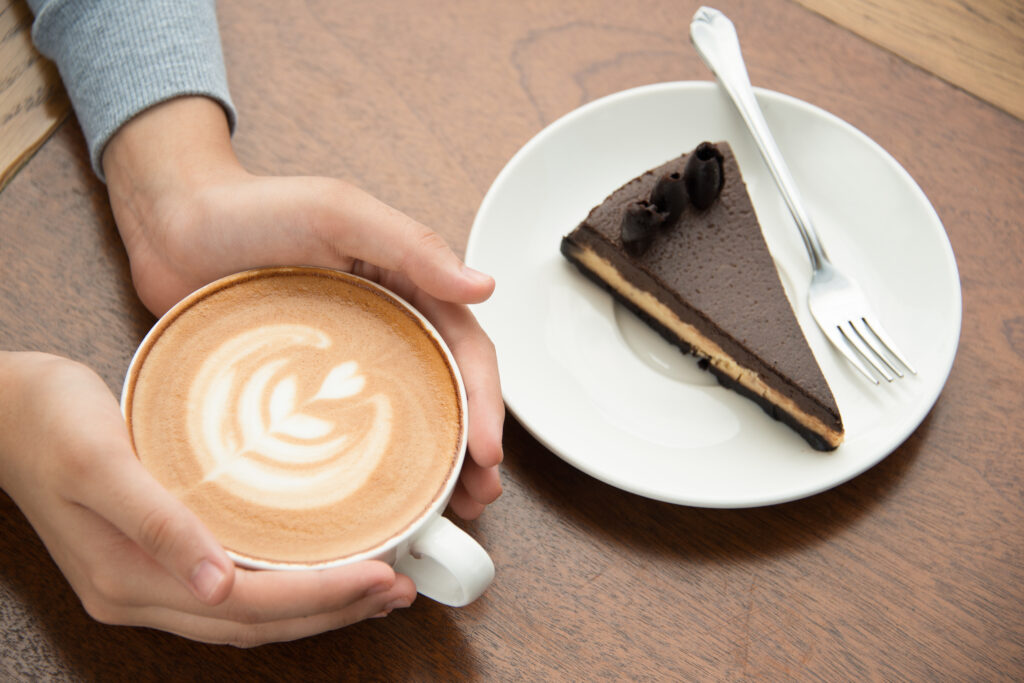
- Understand the caffeine-anxiety connection:
Explore the complex link between caffeine and anxiety. Although caffeine is a stimulant that can increase alertness, excessive consumption can contribute to increased stress levels. Learn to find the sweet spot that works for your individual tolerance. - Effect of Sugar on Mood:
Unravel the link between sugar and mood. While indulging in sweets can provide momentary pleasure, the resulting blood sugar fluctuations can lead to mood swings and increased anxiety. Choose balanced, low-glycemic snacks for more stable energy levels. - Choose natural sweeteners:
If you have a sweet tooth, choose stevia, honey or maple syrup as natural sweeteners. These alternatives can provide sweetness without causing a spike in blood sugar levels and a crash. - Hydrate with water:
Prefer hydration with water instead of sugary or caffeinated drinks. Staying well hydrated supports overall health and can have a positive effect on mood and energy levels. For a refreshing twist, try infusing water with fruit or herbs. - Listen to your body:
Pay attention to how your body reacts to caffeine and sugar. Everyone’s tolerance is different, so it’s important to listen to your body’s cues. If certain foods or drinks consistently negatively affect your mood, consider adjusting your intake accordingly.
Balancing caffeine and sugar intake is an important step in naturally managing anxiety. By adopting mindful habits and making informed choices, you can create a diet that supports not only physical health, but also a state of mental well-being. Embrace the journey of finding your personal balance for a calmer and more centered you.
7.Journaling and Expressive Writing:
In the realm of anxiety reduction, the transformative power of journaling and expressive writing takes center stage. we explores the myriad ways that putting pen to paper can be a cathartic and effective tool for relieving anxiety and promoting mental well-being.
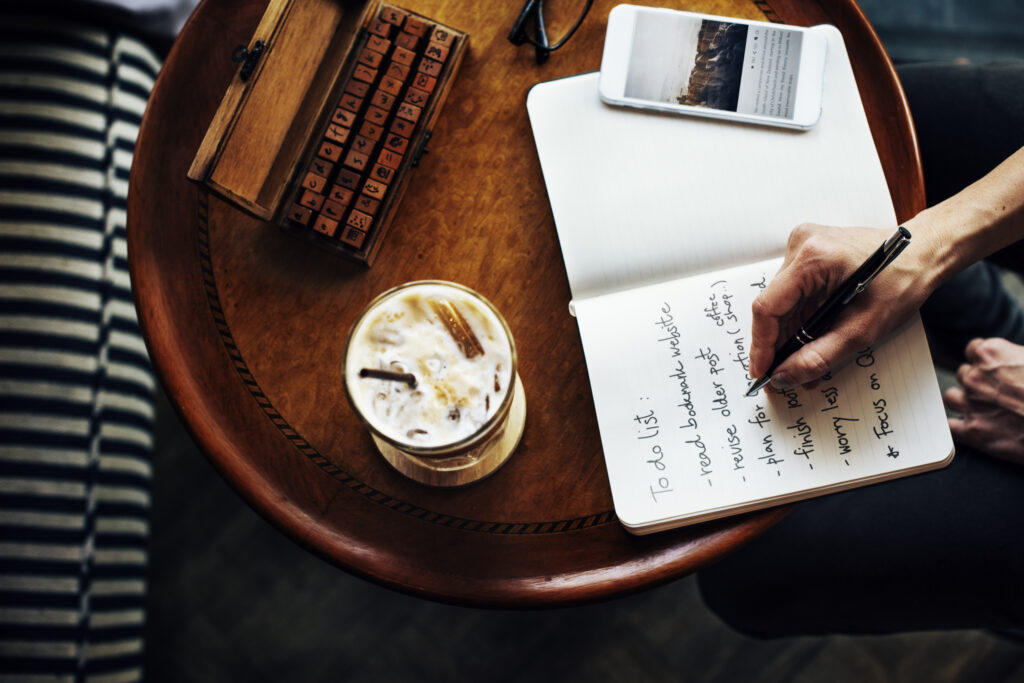
- Establish a daily journaling routine:
Develop a daily journaling habit to create a constant outlet for your thoughts and feelings. A structured routine provides a dedicated time and space for self-reflection, fostering a sense of discipline amidst the uncertainties of life. - Free Expressive Writing:
Embrace free expressive writing as a fluid and unfiltered way to release spontaneous emotions. Let your thoughts flow without judgment or concern for structure, allowing the process to be a raw expression of your inner world. - Create a problem log:
Create a problem log to track and analyze recurring problems. Documenting stressors can help identify patterns, allowing you to develop effective strategies to manage and reduce specific stressors over time. - Write a letter to yourself:
Engage in the therapeutic practice of writing letters to yourself. These letters can serve as a form of self-compassion, offering encouragement, understanding, and reassurance during difficult times.
Explore the therapeutic art of journaling and expressive writing as powerful tools in your arsenal for anxiety reduction. Whether you’re venting frustration, practicing gratitude, or finding creative outlets, the act of putting thoughts down on paper can be a transformative journey toward a calmer and more resilient state of mind. Embrace the power of words as you navigate your way to anxiety relief through journaling and expressive writing.
8.Mindfulness Meditation:
In the hectic landscape of modern life, mindfulness meditation emerges as a transformative practice for achieving peace and enhancing overall well-being. This guide explores the depths of mindfulness meditation, uncovering its myriad benefits and providing practical insights for integrating the practice into your daily routine.

- Embrace the present moment:
Central to mindfulness is the art of embracing the present moment. By focusing, you can develop greater awareness of your thoughts, feelings, and surroundings, fostering a sense of calm amidst the chaos of life. - Body Scan Meditation:
Experience the transformative power of Body Scan Meditation. This practice involves systematically directing your attention through different parts of your body, relieving stress and developing a deeper connection between mind and body. - Walking and moving carefully:
Incorporate mindfulness into your movements. Whether through mindful walking or incorporating mindfulness into an exercise routine like yoga, the combination of breath and movement creates a holistic experience that elevates both physical and mental well-being. - Loving Meditation (Metta):
Immerse yourself in the heart-opening practice of lovingkindness meditation. By cultivating feelings of compassion and goodwill for yourself and others, you can foster a positive mindset and reduce the effects of negativity. - Consistency and Progress:
Adopt the principle of consistency in your mindfulness practice. As you commit to regular sessions, you will witness a progressive change in your mental clarity, flexibility, and overall well-being.
Embark on a journey of self-discovery and relaxation through mindfulness meditation. As you integrate these practices into your life, you’re not just reducing anxiety. You are promoting a profound change in your relationship with the present moment. Embrace the art of mindfulness and open the door to a calmer, more centered existence.
9.Social Connections:
Within the anxiety reduction framework, the role of social connections is highlighted as a powerful thread woven into the fabric of well-being. This guide unpacks the importance of meaningful relationships, providing actionable insight into how fostering social connections can be a key strategy in reducing anxiety.

- Engage in face-to-face communication:
Promote face-to-face communication whenever possible. Whether it’s drinking coffee, going for a walk, or attending social events, in-person connections offer a deeper level of engagement that helps reduce anxiety. - Leveraging Technology for Connection:
Embrace technology as a tool to maintain connections. Video calls, voice messages, and social media can help bridge physical distance, allowing you to stay connected with friends and loved ones, even when they’re apart. - Join Social Groups :
Expand your social circle by joining groups related to your interests. Shared activities create natural opportunities for communication, provide a sense of community and reduce anxiety associated with social interactions. - Open up about your feelings:
Foster open communication within your relationship. Sharing your feelings and concerns with trusted individuals fosters understanding and cooperation, creating a safe space for expression and anxiety reduction. - Practice active listening:
Improve active listening skills in your social interactions. Being fully present and paying attention when others speak strengthens the quality of your relationship, increasing mutual understanding and emotional support.
Social connections act as a powerful antidote to anxiety, offering a tapestry of support and understanding. By actively cultivating meaningful relationships and finding connections that align with your values, you’re not only reducing anxiety; You’re building a resilient network that improves your overall well-being. Embrace the transformative power of social connections on your journey to a more balanced and anxiety-free life.
10.Engage in Positive Self-Talk:
Negative self-talk was a big contributor to my anxiety. I started practicing positive affirmations and challenging negative thoughts. Replacing “I can’t handle it” with “I can manage it, one step at a time” has made a huge difference in how I approach stressful situations.
Here’s a detailed look at how positive self-talk can help reduce anxiety and practical steps to incorporate it into your daily routine.
Understanding the effects of self-talk on anxiety
Self-talk refers to the internal dialogue that goes on in our minds. For many people, especially those with anxiety, this internal dialogue is negative and self-critical. Negative self-talk can increase feelings of anxiety, creating a cycle of stress and anxiety. On the other hand, positive self-talk can break this cycle, helping to reduce anxiety by promoting a more supportive and optimistic mindset.

How positive self-talk reduces anxiety.
- Eliminates negative thoughts: Positive self-talk helps to eliminate negative thoughts that fuel anxiety. By consciously replacing negative thoughts with positive ones, you can change your perception of stressful situations.
- Builds Self-Esteem: Encouraging and supportive self-talk boosts self-esteem. When you believe in your ability to handle challenges, you are less likely to be overwhelmed by anxiety.
- Promotes Resilience: Positive self-talk promotes resilience by helping you stay calm and focused during stressful situations. This encourages a proactive approach to problem solving rather than panicking.
- Enhances Emotional Regulation: Positive self-talk improves your ability to regulate emotions. When you show kindness and compassion to yourself, you are better equipped to manage anxiety effectively.
- Be patient: Changing the way you talk to yourself takes time and effort. Be patient with yourself and practice positive self-talk consistently, even when it feels difficult.
FAQS
Can you heal anxiety naturally?
Yes, you can naturally cure anxiety through regular exercise, mindfulness meditation, a healthy diet, adequate sleep, and herbal remedies. Techniques such as positive self-talk, spending time in nature, and limiting caffeine and alcohol also help. These methods can significantly reduce anxiety and improve overall well-being, although professional guidance is recommended for severe cases.
What foods are good for anxiety?
5 Foods are best that can help you beat anxiety
- Fatty fish (rich in omega-3 fatty acids)
- Dark chocolate
- Yogurt (probiotics)
- Green tea (L-theanine)
- Blueberries
How to stop panic attacks forever?
Stopping panic attacks forever involves a combination of lifestyle changes and professional help.
- Regular exercise
- Mindfulness meditation
- Deep breathing techniques
- Avoid caffeine and alcohol
- Maintain a healthy diet

